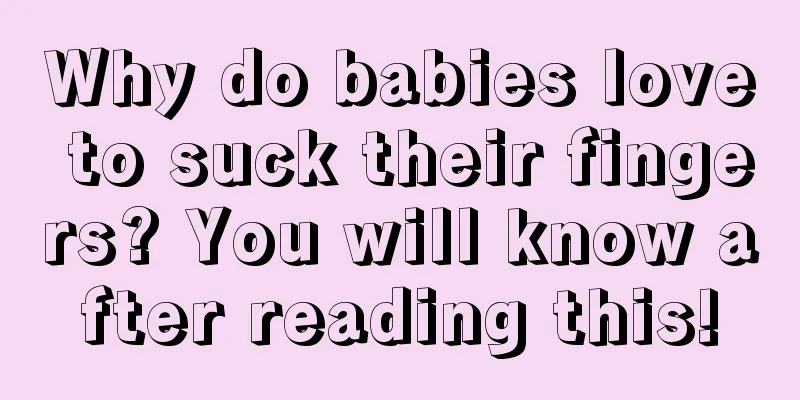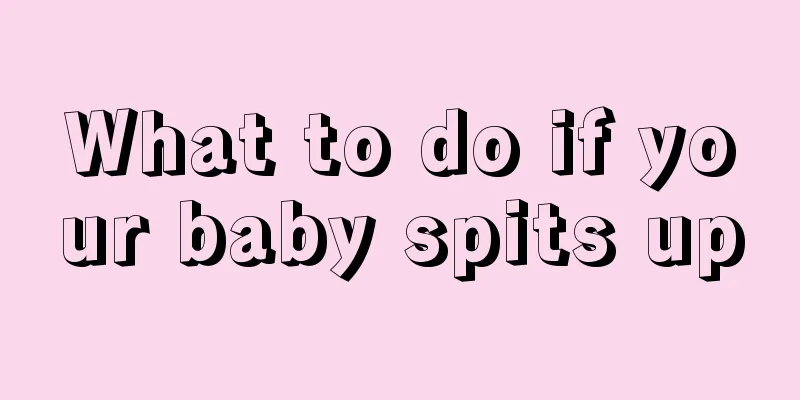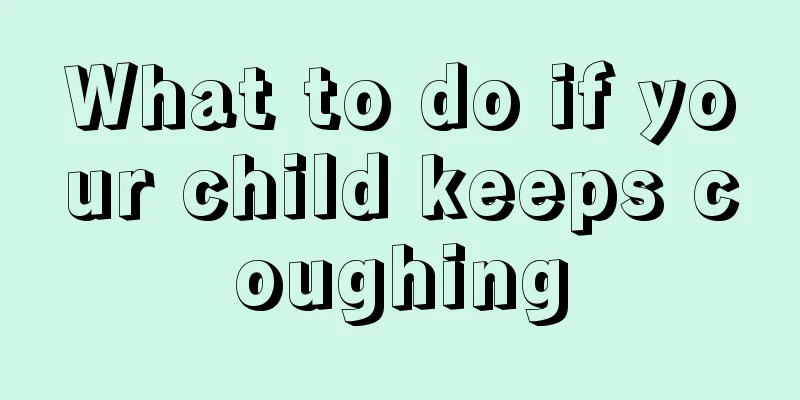Why do babies love to suck their fingers? You will know after reading this!

|
People often praise newborns, saying that they know how to put their fingers in their mouths and suck them as soon as they are born, and they will never go hungry in the future. However, when the baby is three or four months old, if he sucks his fingers and drools all day long, adults will start to worry. In fact, this is not the baby's fault. Parents should know how to guide him in time. Reasons why babies love to suck their fingers In fact, liking to suck fingers or bite other things does not mean that the baby wants to eat or is hungry, nor is it because the baby's fingers are sweet as some people say. When a baby sucks his fingers, it means that he wants to understand his own abilities and is actively exploring the outside world. It shows that the baby's ability to control his own actions has greatly improved. It is not easy for a baby to put objects into his mouth with his own strength. It also indicates that the baby's intelligence in coordinating hand and mouth movements has developed to a certain level. Sucking fingers also plays a certain role in stabilizing the baby's own emotions. When babies are hungry, tired or angry, they can calm down by sucking their own fingers. If parents mistakenly think that this is a bad habit and try to stop it, not allowing their baby to suck their fingers will cause the baby to be dissatisfied and cry, or even have mood swings. In fact, there is no need to stop them, because most babies are exposed to more and more things as they grow older, and their hand-eye coordination and hand functions become more proficient. They can take new things around them and play with them, so the games of looking at hands and sucking fingers will gradually fade away, and this behavior will gradually disappear naturally. Should I correct my baby's finger sucking? Parents should realize the significance of children sucking their fingers and biting things, and do not forcibly stop this behavior. As long as the baby does not break his fingers, let him suck as much as possible under the premise of cleanliness and safety. Otherwise, it will affect the development of the baby's eye-hand coordination and grasping ability, and destroy the baby's unique self-confidence. It should be noted that sucking fingers has certain benefits for early infants, but generally after eight or nine months of age, babies will stop sucking their fingers. It is a transient phenomenon during the child's growth process. Healthy children usually start to grow teeth at the age of six or seven months. If the habit of sucking fingers has not stopped, the teeth at the finger-sucking site will not erupt fully, resulting in a finger-sized gap between the upper and lower teeth. In addition, when children often bite their fingers, due to the constant sucking action, the cheeks on both sides contract, causing the teeth to form an arched shape and become narrower, and the upper front teeth to protrude. At the same time, due to the traction of the fingers, the mandibular protrusion deformity can also be caused. Therefore, after the child is six months old, parents must pay attention to the child's behavior. If you find that the child is still sucking his fingers, you can apply something bitter on the child's fingers, such as the drug berberine, or you can use finger cots or gloves to stop it. If the child still sucks his fingers after one year old, it should be considered a bad habit and efforts should be made to correct it. After the age of 2-3, this phenomenon is greatly reduced, but some children will still suck their fingers when they are hungry, lonely, bored, anxious, in pain or unwell. If this behavior is observed occasionally or does not last long, it is normal and will disappear as you age. But if a child continues to suck his fingers for fun as he grows older, it means that the child has a behavioral deviation. If the child's bad behavior is not corrected in time, it will become fixed and become a stubborn habit. |
<<: How to treat vomiting and stomach pain in children
>>: When your baby switches to breastfeeding, pay attention to these things
Recommend
The child vomited three times at night
It is very hard for mothers to take care of child...
I still have diarrhea after taking deep hydrolyzed milk powder
After the baby is born, the main issue that needs...
Normal neonatal breathing and consequences
With the development of the times and the impleme...
What are the dangers of primary school students not eating breakfast?
We all know that primary school students are in t...
Is it good to bathe a newborn baby every day?
It is not good to bathe newborns every day. There...
What kind of rice noodles are good for children?
When the baby grows to 6 months, the gastrointest...
Neonatal stool occult blood positive
In our lives, it is very common for newborns to h...
What are the recipes for babies with zinc deficiency?
It is a common phenomenon that babies lack zinc. ...
What foods are good for babies' eyes?
Eyes are the most important organs of the human b...
Can babies smell the scent of floral water?
Floral water is a must-have item for us in summer...
What should I do if my child has repeated colds and coughs?
Many parents must have had this experience: their...
Can children with mild cerebral palsy heal on their own?
There is a certain chance that newborn babies wil...
What should I do if my six-year-old child is constipated?
The physical health of children has always been a...
What are the symptoms of orchitis in children?
We know that a healthy man actually has two testi...
Things to note when your baby gets chickenpox
Chickenpox is a really annoying disease. It can a...









